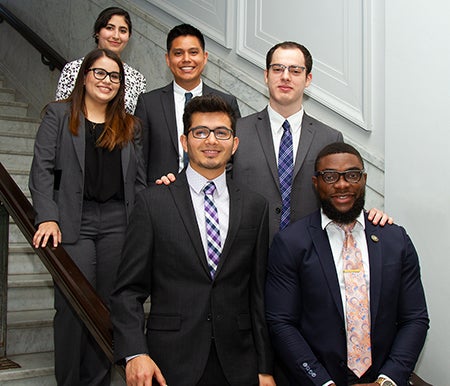News & Highlights
Topics: Diversity & Inclusion, Five Questions, Health Disparities, Mentoring
Five Questions with Ross O’Hagan
A 2019 VRIP medical student describes the program’s meaningfulness and how COVID-19 has affected his medical education.

Ross O’Hagan was in the 2019 Visiting Research Internship Program (VRIP), a summer program for medical students designed to foster diversity and interest in clinical and translational research. He is now a rising third-year medical student at Icahn School of Medicine at Mount Sinai in New York City.
How meaningful was last summer’s VRIP experience in clarifying your career goals?
VRIP has been crucial in my current studies and career goals. I came hoping to learn how to use my computational background to help improve clinical outcomes in some aspect. Working with my mentor Ronilda Lacson, MD, PhD, I saw how she was able to use her technical skills for hospital-wide interventions. She not only would create these brilliant algorithms, but would also work seamlessly with her hospital system to ensure they were being used to save lives. This experience not only reaffirmed my desire to be a clinician who does research, but it also gave me a mentor I can reach out to when trying to figure out how to have the biggest impact possible.
“This experience not only reaffirmed my desire to be a clinician who does research, but it also gave me a mentor I can reach out to when trying to figure out how to have the biggest impact possible.”
I made many friendships and meaningful connections with amazing clinicians and scientists. They all had so much they could teach me, which was a great experience. I find myself relying on casual tidbits I picked up in conversation almost daily.
How were your studies affected by COVID-19?
New York City was hit particularly hard and we were under stay-at-home orders. I stayed in my dorm, trying to study for the step one medical licensing exam. My parents live in the city and have some health concerns, so I was getting their groceries and medications.
Thankfully, I was able to continue doing research at the Hasso Plattner Institute for Digital Health at Mount Sinai under Girish N. Nadkarni, MD, and Benjamin Glicksberg, PhD. Mount Sinai has been at the epicenter of this crisis and treats a diverse patient population, so they have a wide range of genomic and healthcare data that we’re collecting. I was helping them do a study looking at all the clinical characteristics of COVID-19 patients.
The impact that socioeconomic factors make is really staggering. Mount Sinai has many locations, but the one I’m at is in Spanish Harlem, where there are many health disparities. There are significant barriers to healthcare, healthy food, and education. While the data is preliminary, you can see time and time again that depending on where people are located, their outcomes vary, which is truly tragic.
I’m now doing three weeks of telehealth rotations for ambulatory care, which is a novel and cool experience reflective of the future of healthcare. I get evaluated for doing a physical and history over Zoom.
Were you raised in New York City, and how did your parents influence or inspire you?
“The impact that socioeconomic factors make is really staggering…you can see time and time again that depending on where people are located, their outcomes vary, which is truly tragic.”
I grew up in a small town called Ardsley, it’s one square mile, but both of my parents are from Brooklyn. It was always their dream to come back to the city. Now they’re in the city close to me, which I absolutely adore. My dad is one of the most logistical, brilliant lawyers I have ever known, and he’s as much of an Irish boy from New York as you can get. My mom is an Argentinian from Brooklyn and is charming with a loving, kind heart, always asking how I am and if can she help me in any way. They really instilled drive and kindness into me.
What do you hope you’ll be doing in five years?
I’d like to be in an internal medicine program at a phenomenal institution that allows me to do research using computational methods to help bring down social and economic disparities. Systemic injustices are so widely prevalent and there are so many angles to tackle them that I think using different algorithmic computational methods could truly help.
Tools and systems could make the huge, complex healthcare system easier to navigate. The impact you could have on so many patients so quickly is unreal. It’s important for me to help patients firsthand and to try to learn what problems are actually facing them. Then, by using my computational background, I could try to make an impact. Fingers crossed.
What are some ways you’ve personally stayed grounded?
Chess is definitely a guilty pleasure, which I do when I should be studying. I’ve also been making kombucha, a fermented tea product. As a broke medical student, not having to pay $6 for a bottle and being able to make my own flavors is a lot of fun.
I normally have five roommates, but after classes ended it was just one PhD student and me. It has been a little isolating. One of the great things about my school is so many people live in the buildings together, so we usually have a constant support network.
Now that things are starting to go back to normal, I’ve enjoyed catching up with classmates and eating at restaurants outside.

